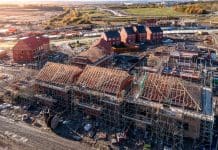Stroma Certification (Stroma) has certified Sewell Construction to its BIM Certification Scheme in line with the PAS 1192-2:2013 standard
The certification from Stroma provides evidence to Sewell’s employers and their supply chain and collaborative partners (Clients, Employers, other Tier 1’s, and their supply chain) of their ability to supply their services in accordance with the requirements of BIM Level 2.
A prominent Tier 1 contractor based in Hull, Sewell joins many other organisations globally that have achieved certification. The UK industry is demonstrating a continued evolution in line with BIM Level 2, allowing organisations to improve process and resource efficiency in project delivery and offer better value to clients.
The PAS 1192-2 (Specification for information management for the cap/delivery phase of construction projects using BIM) scheme was developed to by Stroma Certification to meet the requirement for centrally procured Government projects to be delivered to BIM Level 2 from April 2016. The scheme aims to help the architecture, engineering, and construction (AEC) industry to achieve compliance with BIM Level 2, and was developed in collaboration with influential industry experts. It has been designed to provide distinction on the functions of the supply chain. This allows organisations as designers, contractors and supply chain to understand and place themselves into the BIM process with greater transparency; and provide evidence that they are capable to deliver BIM projects.
BIM Certification can apply to many disciplines within the AEC industry. Stroma Certification is working with main contractors, architects, structural engineers, civil engineers, subcontractors, designers and other roles to certify them to BIM related standards. Each certification defines the precise scope and role that a particular organisation fulfils within BIM.
BIM is designed to promote process and resource efficiency through the effective management and exchange of digital information to deliver improved transparency and collaboration. The benefits of BIM adoption include cost reduction and waste reduction. It can significantly improve the management of asset, improve energy efficiency and reduce carbon impact. Furthermore, it has the potential to drive more opportunities within an industry that needs more workers with a diversity of skills to push the boundaries of innovation as we go into the era of Digital Britain.
Rob Cawkwell, Managing Director, Sewell Construction said: “Achieving certification to BIM Level 2 demonstrates our commitment to complying with the requirements of our Public Sector Partners and future Public Sector Clients.”
Matt Longden, Design Manager, Sewell Construction comments: “BIM Level 2 certification has been an aspiration of Sewell since the Government announced it as being one of their pre-requisites to work on their projects. The whole company, and our supply chain, has embraced the roll out of BIM and all our relevant schemes are now delivered in a BIM environment to Level 2. We are already looking at ways in which we can further integrate our Facilities Management business into the process to bring even greater value to our clients.”
Niraj Mistry, Senior BIM Assessor, Stroma Certification added: “BIM Certification is a great achievement for Sewell Construction which will help them collaborate more effectively with the rest of the supply chain. Digital Construction is key to the Government’s Construction Strategy and we look forward to working with our other clients in the coming year.”














